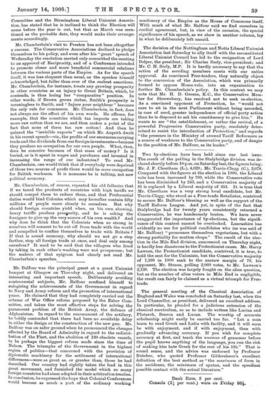Mr. Balfour was the principal guest at a great Unionist
banquet at Glasgow on Thursday night, and delivered an interesting and important speech. Deliberately avoiding controversial subjects, Mr. Balfour confined himself to eulogising the achievements of the Government in regard to Navy and Army reform and the promotion of international peace. He claimed that they had completely carried out the' ucheme of War Office reform proposed by the Esher Com- mittee, and taken the most effective steps for solving the paramount problem of the British Army, the defence of Afghanistan. In regard to the rearmament of the artillery, he boldly contended that there had been no avoidable delay in either the design or the construction of the new gun. Mr. Balfour was on safer ground when he pronounced the changes effected by the Board of Admiralty in regard to the redistri- bution of the Fleet, and the abolition of 130 obsolete vessels, to be perhaps the biggest reform made since the time of Nelson. The triumphs of the Government in the highest region of politics—that concerned with the provision of diplomatic machinery for the settlement of international differences—were as great as, or greater than, those he had described. Our country had rightly taken the lead in this great movement, and furnished the model which so many foreign countries had since adopted in their arbitration treaties. In conclusion, he expressed the hope that Colonial Conferences would become as much a part of the ordinary working
machinery of the Empire as the House of Commons itself. With much of what Mr. Balfour said we find ourselves in cordial agreement, but, in view of the occasion, the special significance of his speech, as we show in another column, lay in what he deliberately left unsaid.






































 Previous page
Previous page